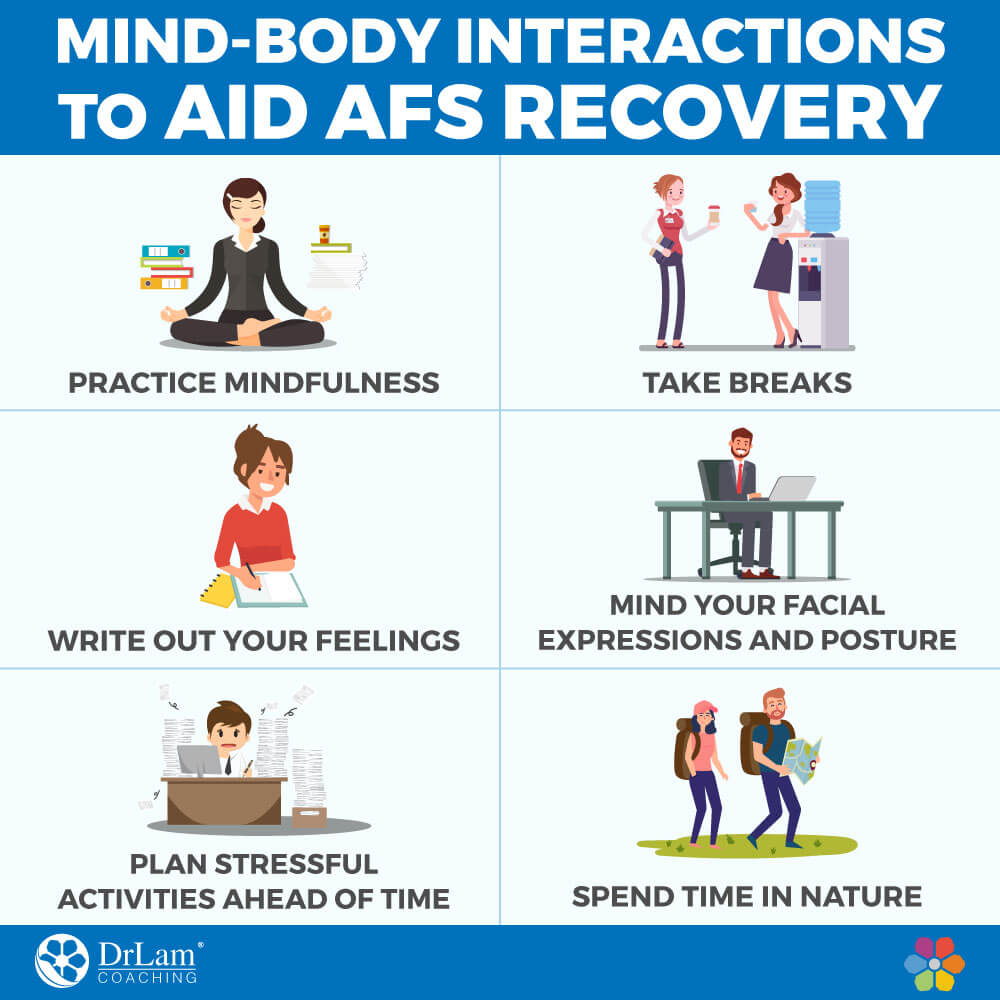In today’s world, stress has become unavoidable. However, especially chronic stress can affect one’s health drastically. It can drain your energy to the point that you become weak both physically and mentally. One of the most effective ways to counter this effect is to learn how to moderate your mind body interactions. In doing so, you can learn to maintain a state of calm in times of great stress and avoid getting overworked. Even better, it gives you the best chance of avoiding adrenal fatigue.
 When the body encounters stress, it initiates a response that is meant to assist you in fight or flight. This is known as the NeuroEndoMetabolic (NEM) Stress Response system. Using several organs and body functions, the NEM Stress Response system encompasses six immediate responses, including the cardionomic, metabolic, inflammatory, hormonal, detoxification, and neuroaffective responses.
When the body encounters stress, it initiates a response that is meant to assist you in fight or flight. This is known as the NeuroEndoMetabolic (NEM) Stress Response system. Using several organs and body functions, the NEM Stress Response system encompasses six immediate responses, including the cardionomic, metabolic, inflammatory, hormonal, detoxification, and neuroaffective responses.
The inflammatory response, in particular, can affect one’s mind body interactions. Typically, inflammation response works by creating a hostile environment for any harmful intruder to fight it off. In the process, it also cleans away any damaged tissues and cells from the immune system’s attack, injury, or pathogens.
At the same time, when a person encounters stress, the sympathetic nervous system is also stimulated. Once this system is triggered, it increases the production of the molecule nuclear factor kappa B (NF-kB). The NF-kB, in turn, activates genes to produce cytokine proteins. These cytokines trigger inflammation in the body at a cellular level, which is useful for a temporary flight or fight reaction.
When the stress is chronic, however, the inflammation is prolonged to the point that it starts to harm the body and becomes the source of several problems. In fact, a study conducted by the Emory University School of Medicine and the University of Pittsburgh School of Medicine found that chronic exposure to relatively high levels of inflammatory cytokines can lead to depression and several neuropsychiatric disorders. A study conducted by the Polish Academy of Sciences also found a connection between cytokines and hormonal changes that occur when a person is exposed to stress. It also implicated cytokines as a cause for anxiety disorders and clinical depression.
It is also possible for inflammation to occur as a result of stress. When this happens, the low-grade inflammation increases the permeability of the body’s gut lining. As a result, harmful toxins are able to enter the bloodstream, leading to autoimmune conditions, allergies, and other hard-to-identify problems.
When nothing is done to reverse the situation, inflammation continues to persist as the body’s other functions also begin to fail to respond to stress effectively. Eventually, this can lead to a significant hormonal imbalance in the body and trigger Adrenal Fatigue Syndrome (AFS). And because of the compromised nervous system, one can also experience increased anxiety, depression, and anger due to adrenal fatigue.

Fortunately, by improving your mind body interactions, you can prevent stress and inflammation from wreaking havoc on your mental and physical health. These tips will help you incorporate more relaxation and calm into your daily life:
Mindfulness refers to a state of being completely present in the moment. It gives you the opportunity to observe your feelings and thoughts without judging whether they are good or bad. Because of this, you are able to process your situation better without increasing your stress and anxiety levels.
Actively deciding to take a break and making time for quiet moments can help you calm down. Taking part in some active breaks gives your brain the time it needs in order to regroup and reboot. If you are dealing with a stressful situation, walk away from it for a few minutes. This gives you a change in perspective and can help you find a better way towards resolving the issue.
Get a notebook and turn it into your journal. Go ahead and write about how you are feeling and read it back to yourself. This gives you the chance to slow down, sort out your feelings, think things through, and notice new ways to improve your situation.
Believe it or not, your body’s expressions and posture can also affect your mood. In fact, your body uses your expressions as cues to more fully feel emotions. Scowling can make you feel angry, but smiling more can result in feeling happier.
If you are stressing out about performing a difficult activity or public speaking, it is important to be able to practice ahead of time. It works best if you can practice in conditions that are similar to the ones you will be under when you perform the actual activity. This reduces the sense of overwhelm when you perform in real life, leading to less anxiety and stress.
 If you are looking to relax and get away from it all, go somewhere that allows you to immerse yourself in the wonders of nature. Studies show that recreational experiences in nature can help mitigate stress, and exposure to images of natural landscapes can help one recover from mental fatigue.
If you are looking to relax and get away from it all, go somewhere that allows you to immerse yourself in the wonders of nature. Studies show that recreational experiences in nature can help mitigate stress, and exposure to images of natural landscapes can help one recover from mental fatigue.
To improve your mind body interactions, these activities can put you in a calmer state, heal blockages of your mental and physical energy, and help you practice modulating the interactions between your mind and body. They are a good way to get back in control.
By using the mind, brain, body, and behavior to improve physical functioning and promote better health, you are better able to fight off stress and recover from adrenal fatigue.
A recently published study in the Frontiers in Immunology journal found that these mind-body interventions can reduce cytokine and NF-kB levels. This can possibly lead to a reversal of prolonged pro-inflammatory effects in the body as a result of stress. Not only that, but these interventions can also reverse molecular reactions within the DNA that can trigger depression.
Before you decide to give any of these interventions a try though, it’s always a good idea to see your physician first. Some of these activities involve physical exercises and movements that may affect preexisting conditions, such as AFS.
That said, here are some mind-body interventions that help ensure you have much better mind body interactions throughout your life:
Yoga is a practice that involves the utilization of breathing techniques, physical postures, relaxation, and meditation. With every yoga position, you are encouraged to pay attention to the connection between your body and mind. Through this, your mind and body interactions improve when you practice yoga regularly. The Adrenal Yoga series, for example, is specially designed to help AFS sufferers without triggering adrenal crashes.
 Originating in ancient China, tai chi involves the process of using slow but precise physical movements while focusing on your internal energy. Once you are able to feel this connection better, the internal energy can be converted into an internal force, which generates greater internal energy. If you have advanced adrenal fatigue, however, this may be too much for your body to handle.
Originating in ancient China, tai chi involves the process of using slow but precise physical movements while focusing on your internal energy. Once you are able to feel this connection better, the internal energy can be converted into an internal force, which generates greater internal energy. If you have advanced adrenal fatigue, however, this may be too much for your body to handle.
Meditation involves the use of focused attention and maintaining an open attitude when dealing with distractions. As you proactively increase relaxation and calmness in your body, it leads to significantly improved psychological balance. Like mindfulness, meditation enables you to notice thoughts without getting too wrapped up in them, and maintain a calm center, despite chaotic events around you. This, in turn, improves overall well-being, reduces stress, and helps you cope with illness better.
Biofeedback is a type of therapy which involves electrodes attached to the skin or finger sensors. These measure your skin temperature, sweating, muscle activity, breathing rate, heart rate, and blood pressure, among others. These sensors then send signals to an active monitor displaying flashes of light, images, or sounds that represent your body’s stress responses. With your stress responses visible, a biofeedback therapist teaches you relaxation exercises to help improve your response to stress. These exercises may be in the form of deep breathing or meditation.
Hypnosis involves putting you in a trance state so that it may look like you are asleep, but you remain alert. Here, one is immersed in an imaginary world that allows you to tune out all your worries as you feel more relaxed and uninhibited. Because of this, it gives you the chance to fully engage with your emotions, worries, and any sort of stress. At the end of the session, you gain more awareness of your situation so that you can deal with problems in your life better. This, in turn, leads you to become a calmer and more confident individual.
Progressive muscle relaxation involves teaching you how to relax your muscles at will, which can be particularly helpful in times of stress. This technique involves two steps. First, you systematically tense up certain muscle groups in your body, such as your shoulders or neck. Then, you release the tension and pay special attention to how your muscles feel the moment you relax them.
This practice has been known to help increase calmness, especially when you are already feeling anxious. In addition, it has also been known to help reduce instances of headaches and stomachaches. It has also been reported to improve sleep quality.
 An ancient healing practice, acupuncture seeks to clear energy channels using the stimulation of specific points located on the body using a number of techniques. These include manipulating the points by hand, applying electrical stimulation, or penetrating the skin using needles.
An ancient healing practice, acupuncture seeks to clear energy channels using the stimulation of specific points located on the body using a number of techniques. These include manipulating the points by hand, applying electrical stimulation, or penetrating the skin using needles.
However, while acupuncture can be beneficial, it is often accompanied by only a short-term sense of well-being followed by crashes. The weaker the body or the more advanced the AFS, the bigger the risk.
Any of these mind-body interventions can help you achieve more peace in your life by enhancing your ability to experience your mind body interactions and take control of them. This is especially helpful when you are faced with unending episodes of stress and suffer from chronic inflammation or adrenal fatigue.
All or any of these methods are worth a try so that you know which works best for you, but make sure you consult your doctor first. Many changes can trigger adrenal crashes if you’re not careful.
You can say that your body can be much stronger if you are able to strengthen yourself mentally. When you can use your mind to avoid stress, the rest of your body soon follows. It stops you from panicking in case of stress and you are able to deal with anything that happens in your life in a healthier, more constructive manner.
Improved mind body interactions can help strengthen the mind so that you have a much calmer emotional state. This results in less anxiety and stress, allowing your body to recover from adrenal fatigue and achieve a much more positive outlook in life.
